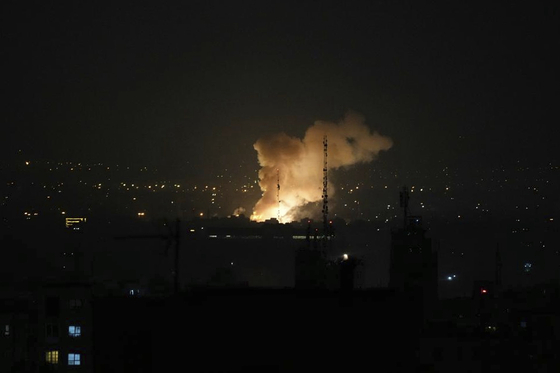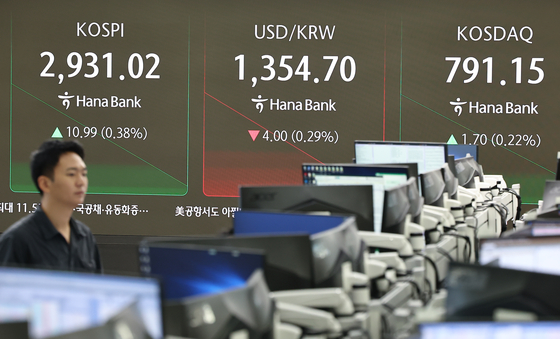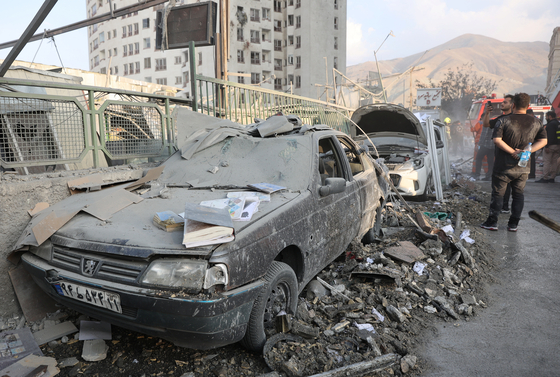Korea's Market Rally Fades as Israeli Airstrike Shocks Global Markets

Smoke rises after an explosion in Tehran, Iran, on June 13. Israel attacked Iran's capital early that day, with explosions booming across Tehran. [AP/YONHAP]
Korea’s benchmark stock indices slipped Friday morning, snapping an eight-session winning streak, as renewed geopolitical tensions in the Middle East weighed on investor sentiment.
The Kospi index fell 0.71 percent, or 20.78 points, to 2,899.25 as of 11:10 a.m. on Friday.
It marked the first decline since June 2 and since the start of the new Lee Jae-myung administration. The index briefly climbed to 2,932.38 during early trading but quickly reversed course as institutional and foreign investors turned net sellers, offloading approximately 446 billion won ($326 million) and 27 billion won in stocks, respectively. Individual investors remained net buyers, purchasing roughly 470 billion won in shares.
The Kosdaq plunged more steeply, down 2.19 percent at 772.22.
The downturn followed reports that Israeli air forces launched a preemptive strike against Iran at around 3 a.m. local time on Friday. According to CNN and Reuters, the attack may have killed key Iranian figures, including Chief of Staff Mohammad Bagheri and senior nuclear scientists. The incident reignited fears of escalating conflict in the region, sending shockwaves through global financial markets.
“The Israeli preemptive strike on Iran has increased volatility in risk assets such as equities,” said Seo Sang-young, an analyst at Mirae Asset Securities.

A screen in Hana Bank's trading room in central Seoul shows Korea's stock indices on June 13. [NEWS1]
Korea’s major blue-chip stocks traded lower across the board. Samsung Electronics dropped 1.85 percent, Samsung Biologics declined 1.07 percent, and LG Energy Solution fell 3.13 percent.
In contrast, defense-related stocks soared on expectations of increased demand. Shares of Poongsan surged 18.61 percent, Huneed Technologies gained 12.27 percent, LIG Nex1 rose 8.7 percent and Victek jumped 8.36 percent. Oil-related companies also rallied, with Korea Petroleum up by the daily limit of 29 percent.
Crude prices climbed amid concerns over potential supply disruptions. As of 10:30 a.m. local time, West Texas Intermediate (WTI) futures traded at $72.93 per barrel, up 7.17 percent from the previous session. Brent crude rose 6.95 percent to $74.18, according to The Wall Street Journal.
Currency markets also reflected the risk-off mood. The U.S. Dollar Index, which measures the greenback against a basket of six major currencies, rose 0.21 percent to 98.13 after hitting a three-year low the previous day. The won weakened 0.68 percent against the dollar, falling from 1,355 to 1,365 won by 9:30 a.m.
Gold prices edged higher as investors sought safety assets. Spot gold gained 1.4 percent from the previous day.

People gather near damaged vehicles in the aftermath of Israeli strikes, in Tehran, Iran, on June 13 in this photo provided by West Asia News Agency. [REUTERS/YONHAP]
Charu Chanana, a strategist at Saxo Capital Markets, told Reuters, “The geopolitical escalation adds another layer of uncertainty to already fragile sentiment."
"If the situation de-escalates quickly, markets may retrace some of the initial moves. But if tensions rise — particularly with any threat to oil supply routes — the risk-off mood could persist, keeping upward pressure on crude and haven assets."
Translated from the JoongAng Ilbo using generative AI and edited by Korea JoongAng Daily staff.
BY HWANG EUI-YOUNG,PARK YU-MI [kim.juyeon2@joongang.co.kr]
0 Response to "Korea's Market Rally Fades as Israeli Airstrike Shocks Global Markets"
Post a Comment